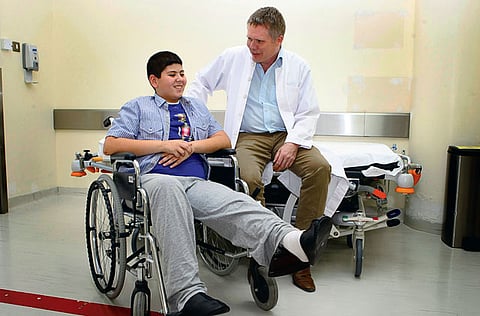A new kick to life
Ismail Youkana hopes to realise his dream of playing football with his mates after a complex surgical procedure sets his bow leg right

Six weeks before Christmas, a special case was brought to Dr Matthias Honl's clinic at the Neuro Spinal Hospital in Dubai. Dr Honl was given the X-rays of Ismail Youkana, a 13-year-old teenager suffering from a congenital bow leg.
The teenager's left leg was slightly longer than his right and curved outward at the knee while his foot twisted inwards. His condition worsened as he grew and his stride was increasingly deformed. A procedure had been performed in Ismail's home country, Algeria, but it did not correct the misalignment of the legs. Consequently, the boy, who walked with a limp, was almost resigned to giving up on his childhood dream of playing football with his school friends.
Rare case
As a practising specialist orthopaedic surgeon for over 20 years, Dr Honl knew that the case was difficult but not impossible to treat. "It was a rare condition and the deformity was extensive," he tells GN Focus. Over the course of his career, he says, he has only treated two to three similar cases. "There had been an imbalanced growth at his left femur or thigh bone and his tibia, the larger of the two leg bones below the knee cap. Due to this there was a bony lump at the knee. The procedure required that we do two simultaneous osteotomies, or bone incisions, and realign the growth lines so that the leg grows normally post surgery," Dr Honl says.
The Dubai-based specialist told Faysal Si Saber, the family friend who had consulted him, he'd be able to help — despite the fact that the boy was also overweight.
So when school closed for the winter break, Ismail and his father, Youkana de Jamal, flew into the city. They met Dr Honl, who scheduled the surgery on December 26.
"When I saw the X-rays I saw the bent bones and the misaligned foot. But meeting the patient made me realise the urgency of the case," Dr Honl says. "I saw a young man dealing with not just the perils of puberty but also the loneliness of being the boy with the limp. As a young boy, I had myself undergone corrective hip surgeries, so I could empathise with him. I knew only too well the pain of being different at this difficult stage of life. I could not let him continue to suffer in silence."
A corrective osteotomy of the femur and tibia was carried out the next day itself. Titanium implants were used to balance the frame at the site of the surgery. The medical team also took care to ensure growing cartilage was not damaged or affected by the operation. Ismail spent four days in hospital and was discharged on New Year's Eve.
"The procedure took approximately four hours. The wait was not easy for us, but we had full faith in Dr Honl," Saber tells GN Focus. "He had been very informative of what had happened to Ismail and how he intended to correct it. Keeping the communication channels open and sharing information with the patient and his family set him apart from other doctors I had consulted. That's why we chose to do the procedure with him."
Ready to play ball
Dr Honl describes the surgery as successful. "He is young and I am sure he will be back on his feet very soon," he says. "We have not put his leg in a cast or restricted his movement in any way. The implants at the site of surgery offer him good support. In another two weeks we will do a follow-up X-ray to check the development of bone tissue and then accordingly remove the titanium implants. For now, he just needs to take it easy and build his strength."
Jamal, who was once nervous about the surgery because the earrlier operation had failed, is now content with his son's recuperation. "Ismail's wound is not fully healed. He still has some pain, but we are happy with the results. He is able to move his foot and position it straight. I have never seen him do that before." The family plans to stay in Dubai until the titanium plates have been removed. For a month, Ismail needs to take it slow and then he can run a normal routine of fun and play.
Bright-eyed Ismail loves good food, enjoys television and appreciates the fun of the outdoors. "At the beach or at the park, I would always be embarrassed to be with my peers," he says. "Instead of going out to play, I would stay home and watch football on TV. It was always this way. But Dr Honl says I will soon be able to run and kick [ball] like those players. So I am hopeful and am really looking forward to the first step I take in 2012."


